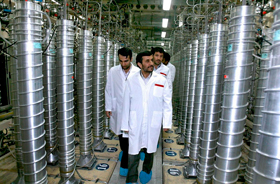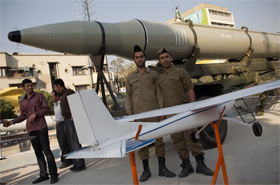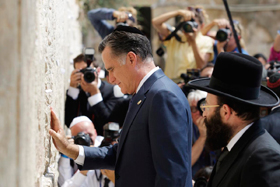IRAN: To Strike or Not to Strike?
Iran's Revolutionary Guards fire missiles
during a war game in desert
(no votes) |
(0 votes) |
After some calm due to the regular rounds of talks between Iran and the ‘five plus one’ group held in Istanbul, Baghdad and Moscow, the Iranian issue is once again beginning to heat up. Since late July, the main topic in Israeli media is the issue of a strike on Iranian nuclear facilities.
Will Israel strike?
After some calm due to the regular rounds of talks between Iran and the ‘five plus one’ group held in Istanbul, Baghdad and Moscow, the Iranian issue is once again beginning to heat up.
Since late July, the main topic in Israeli media is the issue of a strike on Iranian nuclear facilities.
This matter does not seem new as such. There have been bursts of warlike rhetoric both in Tel Aviv and in Tehran in the past. Dates of Israeli strike were even voiced, but they passed and, fortunately, nothing happened. Consequently the world began getting used to the fact that the war of words between Israel and Iran is becoming a usual routine, devoid of meaningful content part of the Middle East “puzzle”, in the sense that Israel uses the threat of force as a means of exerting pressure on Tehran, and perhaps on the Americans, who are not willing to engage in a direct confrontation with Iran. The unacceptable risks associated with the power scenario are in fact too much.
The Iranians claim they are pursuing peaceful nuclear energy, but in fact, it seems they are convinced that, after Iraq and Afghanistan, it is only nuclear weapons that can guarantee their sovereignty and territorial integrity under the ongoing break-up of the Greater Middle East.
This conclusion is correct in terms of formal logic. However, the Middle East is a kind of a mirror world, a Lobachevsky space, where the laws of Euclidean geometry do not exist. Parallel lines in it sometimes intersect, and two times two is not always four. There may be other variants depending on circumstances.
If you look at the confrontation between Israel and Iran from this angle, it is difficult not to notice in it many things that do not fit into the usual logic and established approaches to conflict resolution. In terms of global security for example, Iran’s nuclear program (INP) is primarily a non-proliferation issue, which must be addressed through appropriate international mechanisms (UN Security Council, IAEA, the Group of Six nations). However, talks between Iran and the Group of Six are difficult and held with long intervals.

Iranian President Mahmoud Ahmadinejad
visits the Natanz Uranium Enrichment
Facility
The Iranians claim they are pursuing peaceful nuclear energy, but in fact, it seems they are convinced that, after Iraq and Afghanistan, it is only nuclear weapons that can guarantee their sovereignty and territorial integrity under the ongoing break-up of the Greater Middle East. Moreover, the Iranians are behaving in an arrogant, if not provocative way.
Although not directly involved in the negotiation process, the Israelis have a complex history of relations with the United Nations and, therefore, are basically not inclined to “internationalizing” their problems with neighbors in the region. In such matters, they rely primarily on themselves and their strategic ally – the United States. The situation is not made easy by the fact that Israel, stating that an atomic bomb from the “Ayatollahs’ regime” would be a threat to its existence, retains the constructive ambiguity regarding its own nuclear capacity.
A new factor that makes the discussions taking place in Israel particularly disturbing is the conviction of most of its participants that Prime Minister Benjamin Netanyahu and Defense Minister Ehud Barak are planning to attack Iran before the U.S. presidential election.
This sounds unbelievable. Is this just a bluffing or a preparation of public opinion for an imminent war?
To answer this question, let us consider a number of internal and external factors determining decision-making by the Israeli leadership.
Vox populi
The idea of a unilateral strike on Iran without political support and military aid from the USA is perceived as too risky, if not close to adventurous.
In early August 2012, an Israeli newspaper Maariv conducted a public opinion poll on the INP issue. On the question of whether it is possible to prevent Iran today from manufacturing nuclear bombs through sanctions and international pressure, but without a military strike on its nuclear facilities, 41% of respondents answered “No”. Nevertheless, a unilateral action without involving the USA and the international community was supported only by 35% (40% of them Jews and 12% Arabs), while 39% (35% of them Jews and 46% Arabs) were in favor of leaving this matter for the United States.
The balance of opinion in the higher echelons of the Israeli political elite is somewhat different. The idea of a unilateral strike on Iran without political support and military aid from the USA is perceived as too risky, if not close to adventurous (though, according to prevailing opinion, Israel has the necessary military capability to do so).

Iranian soldiers of the Revolutionary
Guards pose next to a long-range
surface-to-surface Shahab-3 missile
Retired Israeli defense chiefs and heads of security agencies in early 2011 strongly voiced their opposition to a unilateral military action. According to Israeli press reports, the acting Chief of Staff, heads of the military intelligence, Mossad and the internal security service, share a similar view. According to them, a strike, even if successful, will not achieve the desired results but will only delay Iran’s nuclear program by 1.5-2 years. The consequences of such developments will be certainly extremely severe both for the region (a large-scale conflict with possible expansion should oil routes be closed), and for Israel itself. Apart from a real danger of a rocket attack on Israel from the north (Hezbollah) and from the south (Hamas), a unilateral action can critically complicate Israel’s relations with the United States and thereby lead to international isolation.
Theoretically, the government has to agree before hostilities could start. However, in practice, the decision-making system in Israel is built in such a way that the Prime Minister’s view is crucial in such matters. In this regard, the Israeli newspaper Yedioth Ahronoth described the following possible scenario: in an urgent Government meeting, Benjamin Netanyahu and Ehud Barak may explain that it is impossible to discuss the details of military operations in such a wide forum because of the inevitable leakage of information. Given the seriousness of the issue, they may be mandated to continue preparing and set a possible date for military operation. On the said date, they will gather security ministers, and just like in Operation Entebbe (hostage-rescue mission carried out by Israeli special forces at Entebbe Airport in Uganda in 1976), say: “Our jets have headed for Iran, but they can still be called back to Israel if you decide so”. No minister, according to the newspaper, will oppose in such circumstances.
In Israel, people are well aware that in 1981, Menachem Begin, who was then the Prime Minister of Israel, decided to bomb the Iraqi nuclear reactor, despite opposition from Mossad and military intelligence chiefs. However, the Chief of Staff and Commander of the Air Force supported the Prime Minister. Today, all the security officials, including the military, believe that the risks of a strike on Iranian nuclear facilities without the United States support are unacceptably high.
Israeli observers point out another feature of the present “military anxiety”. Prime Ministers Menachem Begin and Ehud Olmert took decisions to strike Iraq in 1981 and Syrian facility in Deir ez-Zor in 2007 respectively, under an atmosphere of absolute secrecy. Now, however, even the most sensitive details (such as aircraft routes and target facilities) of a possible military action are being discussed publicly and even in an emphatic manner. It is not surprising that some Israeli experts see some elements of bluffing in this. “Barak and Netanyahu have already taken decision. At least that is what they want us to believe, or even more importantly, they want to convince Obama in this” – concludes an Israeli observer Ben Ovadia.
The U.S. elections
Virtually in all the Arab-Israeli wars, the Israelis had to deal with an enemy superior to them in economic and military power. However, the Israelis won these wars.
The current round of discussions on Iran coincided with the Mitt Romney, presidential candidate of the Republican Party, visit to Israel in late July 2012. Apparently, this coincidence was not accidental. Mitt Romney, who severely criticized President Barack Obama in Israel for “throwing Israel under the bus”, actually supported the idea of a strike against Iranian nuclear facilities. To say that Mitt Romney’s statements were warmly welcomed in Israel is to diminish the resonance that such statements generated.
According to, perhaps, the most famous commentators in Israel, Nahum Barnea and Shimon Shiffer, after Romney’s visit, the U.S. and Israeli governments resembled “two locomotives rushing toward each other”. The implication of this metaphor is more or less clear: the attitude towards a possible Israeli strike on Iran has become a significant, if not critical factor in the outcome of the U.S. presidential race.
Following Mitt Romney’s visit, the U.S. Defense Secretary Leon Panetta visited Israel in early August as part of a regional tour. He assured the Israelis, on Obama’s behalf, that the United States would not allow Iran to developing a nuclear bomb, but strongly opposed a military action in the near future. According to leaks to the press again, the Pentagon chief explained his position as follows: after the Iranians take the political decision to create a bomb (the Americans proceed on the basis that such decision has not yet been taken), it will take at least one and a half years to accomplish this task, and so, there is still enough time to deal with Iran.
According to Israeli experts, neither Benjamin Netanyahu nor Ehud Barak agreed with this logic. According to the two men, Iran would, by December 2012, make such progress in uranium enrichment and creation of other atomic bomb components that it would enter into the so-called “zone of immunity” where military action becomes ineffective and even dangerous. In addition, the U.S. envoy was reminded that during his time as president, Bill Clinton promised to prevent North Korea from acquiring nuclear weapons but did not keep his promise. “The US can live with a nuclear Iran. Israel cannot” – Netanyahu and Barak summed up.
Such a tough stance by Benjamin Netanyahu and Ehud Barak has its own explanation. First, virtually in all the Arab-Israeli wars, the Israelis had to deal with an enemy superior to them in economic and military power. However, the Israelis won these wars, except the Suez War of 1956, in which Israel acted as a “junior partner” of England and France. As a result, they formed a kind of a “David complex” by the definition of the winning “Goliath”.
In addition, relations between Netanyahu’s right-wing government and Barack Obama’s administration gathered a burden of acute problems associated with different approaches to the strategy and tactics of the Middle East peace process and the Arab Spring, which, for obvious reasons, do not cause as much enthusiasm in Tel-Aviv as in Washington. The stumbling block was Israeli settlement policy, which, in fact, wrecked the mission of Senator George Mitchell to whom the White House entrusted to unlock the Israeli-Palestinian negotiations. As a result, almost all Benjamin Netanyahu’s visits to Washington in the last three years were a “near miss”.
As you can see, the current round of Israeli-US disagreements fits into the overall picture quite smoothly.
So, to strike or not to strike?
It seems that neither Tel Aviv nor Washington has an answer to this Hamlet’s question yet.
The picture is complex, and worthy of Shakespeare’s pen. The behavior of parties involved is determined not only by political and military calculations that are incapable of making unambiguous assessment, the election campaign logic (there are also talks of early elections in Israel), but also by the psychology of leadership, moral responsibility to the country and its people, as well as financial and economic factors. According to preliminary estimates, one day of a regional conflict would cost Israel about 1.5 billion shekels ($328 million).
In terms of formal logic and common sense, going to war is not advisable. Regional and global risks are unacceptably high.
However, let us remember that we are talking about the Middle East, the Lobachevsky space, in an era of drastic changes for that matter.
(no votes) |
(0 votes) |






